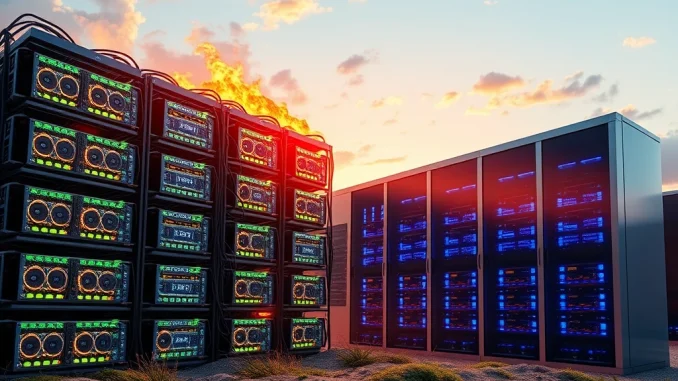
In a move that’s capturing significant attention across both the cryptocurrency and technology sectors, Galaxy Digital is reportedly shifting its focus away from traditional Bitcoin mining towards the booming field of artificial intelligence (AI) data centers. This isn’t just a minor adjustment; it’s a major strategic pivot that analysts believe could dramatically reshape the company’s future profitability.
Why the Shift from Bitcoin Mining?
For years, Bitcoin mining has been a core activity for many crypto-focused firms, including parts of Galaxy Digital. However, the economics of mining are becoming increasingly challenging. A recent report by Rittenhouse Research, highlighted by CoinDesk, points out some key difficulties:
- Halving Events: Bitcoin’s protocol includes a programmed halving event roughly every four years, which cuts the block reward for miners by 50%. This directly reduces revenue unless the price of Bitcoin significantly increases to compensate.
- Price Dependency: Mining revenue is highly sensitive to the volatile price of Bitcoin. Downturns can quickly make operations unprofitable.
- Chip Efficiency Race: Staying competitive requires continuous investment in the latest, most efficient mining hardware (ASICs). This means high ongoing capital expenditure.
- Capital Intensive: Setting up and maintaining large-scale mining operations requires substantial upfront and ongoing investment in infrastructure, power, and cooling.
These factors combine to make Bitcoin mining a high-risk business with revenues subject to significant external pressures and predictable declines.
Exploring the Potential of AI Data Centers
Contrast the challenges of mining with the opportunities presented by AI data centers. The Rittenhouse Research report suggests this area offers a more stable and potentially lucrative path for Galaxy Digital.
AI workloads, particularly those involving training and inference for large language models and other complex algorithms, require immense computational power. This demand translates into a need for specialized data center infrastructure. Here’s why it’s seen as more attractive:
- Stable Cash Flows: Unlike the volatile revenue from selling mined Bitcoin, providing data center services for AI companies often involves long-term contracts with recurring, predictable revenue streams.
- Lower Ongoing Capex (Relatively): While setting up an AI data center is expensive, the ongoing capital expenditure related to hardware upgrades might be less frequent or tied to specific client needs compared to the relentless cycle of ASIC upgrades in mining.
- Growing Demand: The demand for AI compute power is experiencing exponential growth, driven by advancements across nearly every industry. This provides a large and expanding market for data center services.
- Diversification: Moving into AI infrastructure diversifies Galaxy Digital‘s business away from being solely dependent on cryptocurrency market dynamics.
This strategic pivot leverages Galaxy Digital’s existing infrastructure expertise while tapping into a high-growth technology sector with different, potentially more favorable, economic characteristics than Bitcoin mining.
Galaxy Digital’s Concrete Steps
This isn’t just theoretical. Galaxy Digital has already announced concrete steps related to this shift. A key example is their plan to exit certain Bitcoin mining operations and repurpose their Helios facility in Texas. This large-scale facility, originally designed for energy-intensive mining, is being adapted to support the demanding power and cooling requirements of AI workloads. This physical transformation underscores the company’s commitment to the strategic pivot.
Will This Strategic Pivot Boost Profitability?
Analysts at Rittenhouse Research seem to think so. The core argument is that moving towards the stable, growing revenue streams of AI data centers reduces the exposure to the inherent volatility and programmed revenue declines of Bitcoin mining. While the initial investment in AI infrastructure is significant, the long-term outlook for predictable cash flows and potential for higher margins appears promising.
This doesn’t mean AI data centers are without risk. Competition in the data center space is fierce, and staying ahead requires continuous investment in technology and infrastructure. However, compared to the unique challenges posed by Bitcoin’s halving schedule and price swings, the AI market offers a different risk/reward profile that Galaxy Digital appears eager to embrace for enhanced long-term profitability.
Conclusion: A Bold Step Towards Diversified Growth
Galaxy Digital‘s reported shift from Bitcoin mining to focusing on AI data centers represents a bold strategic pivot. Driven by the desire for more stable and potentially higher profitability, the company is actively repurposing assets and expertise to capitalize on the explosive growth in AI compute demand. While the transition will involve challenges, the move away from the predictable revenue pressures of Bitcoin halvings and market volatility towards the recurring revenue potential of AI infrastructure could indeed unlock significant value for the firm in the years to come. It’s a trend many in both the crypto and tech worlds will be watching closely.



